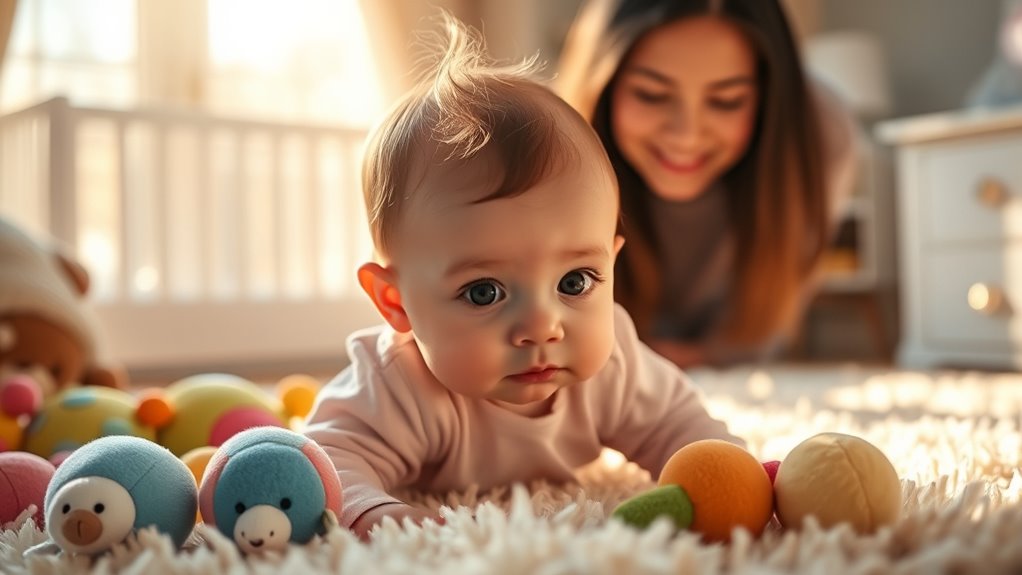To encourage your baby’s first words, engage with them daily through meaningful interactions. Use clear, simple language and repeat words often to reinforce learning. Get excited about their attempts at communication, celebrating each sound. Establish routines for language exposure and choose motivating words that relate to their interests. By following these steps, you’ll create a fun environment for language development, paving the way for those precious first words. Discover even more effective strategies to support your baby’s speech.
Key Takeaways
- Engage with your baby during daily interactions, using clear and enthusiastic language to reinforce word recognition and meaning.
- Use simple, repetitive words related to familiar objects and people to create strong associations with their meanings.
- Provide face-to-face interaction to enhance your baby’s ability to observe and imitate sounds and mouth movements.
- Incorporate educational toys and playtime discussions to make language exposure enjoyable and relatable for your baby.
- Celebrate each attempt at communication, creating a positive environment that encourages further speech development.
Listening for Your Baby’s First Words

As you listen for your baby’s first words, you might be surprised at how quickly they emerge. Babies often surprise you with sounds like “dah!” when referring to familiar objects, such as a dog.
These early words may mimic sounds that are easy to pronounce, like “m,” “p,” and “b.” It’s important to differentiate between babbling and meaningful speech. When your baby uses a word consistently and independently, that’s a sign they’ve hit a milestone. Emotional regulation plays a key role in how babies express their needs and feelings through language.
Early words often mimic easy sounds like “m,” “p,” and “b,” marking important milestones in your baby’s speech development.
To encourage communication, engage with your baby during daily interactions, repeating words clearly and enthusiastically. The more they hear specific words, the more likely they’ll try to use them. Incorporating educational toys into playtime can also enhance language development and encourage vocalization. Additionally, establishing a bedtime routine can provide a comforting structure that promotes language exposure during calm moments.
Celebrate each attempt, as every sound is a step toward their first meaningful words.
How to Know if Your Baby Said Their First Word

Recognizing your baby’s first word can be a thrilling experience, and it’s important to know the signs that indicate they’ve reached this milestone.
Here’s what to look for:
- Consistency: Your baby uses the same word to refer to a specific object or person in different contexts.
- Independence: They say the word on their own, rather than just repeating after you.
- Repetition: The word should be used three or more times in relevant situations, showing understanding.
- Meaningfulness: Distinguish between babbling and speech; their utterance should convey clear meaning. Emotional and psychological growth occurs in stages, which includes the development of language skills. Engaging your baby in structured environments can further encourage their speech development.
Additionally, engaging in emotional connections through talking and reading can significantly enhance your baby’s language development.
A Baby’s First Words May Sound Very Similar

When your baby starts talking, you might notice that their first words sound quite similar, like “dah” and “Dada.”
This is perfectly normal, as babies often use easier sounds and improve their pronunciation over time. Additionally, their vocal exploration is similar to how nail shapes vary in style and complexity.
Plus, they learn by watching and mimicking you, which can lead to those early words sounding alike. Additionally, just as dogs may have similar sounds when communicating, babies also tend to experiment with sounds that are easier to produce.
As they progress, some of these early sounds may reflect their human-centered roles in future interactions, showcasing their developing communication skills.
Common Early Speech Sounds
Many parents notice that their baby’s first words sound remarkably similar, often featuring early speech sounds like “m,” “p,” and “b.” These consonants are easier for babies to articulate, leading to the common repetition of words like “mama” and “dada.”
At this stage, babies typically start with simple vowel sounds and combinations, making their early attempts at speech blend together.
To encourage your baby’s speech development, consider these tips:
- Use common early speech sounds in daily conversations.
- Repeat words and phrases frequently to reinforce learning.
- Respond enthusiastically to your baby’s attempts to communicate.
- Create a positive environment for practicing sounds.
Additionally, engaging in puppy training classes can provide valuable lessons on communication and patience, which can be beneficial as you support your baby’s speech journey.
Pronunciation Improvement Over Time
As your baby begins to form their first words, you’ll notice that they may sound quite similar at first. This is due to their limited ability to produce sounds, so variations like “dah” and “Dada” can be indistinguishable.
However, as they practice language and communication, you’ll witness significant pronunciation improvement. With repetition of words in various contexts, babies refine their articulation, associating sounds with meanings.
Certain consonants, like m, p, and b, are easier for them to articulate, contributing to the similarity in their early vocabulary. Through consistent interaction and practice, your baby will gradually master the nuances of speech, leading to clearer distinctions between their early words.
Enjoy this exciting journey of discovery together!
Imitation and Observation Importance
Imitating the sounds around them plays an essential role in your baby’s speech development. Babies often produce early words that sound similar, like “dah” and “Dada,” due to their developing articulation.
Here are some key points about the importance of imitation and observation:
- Learning through imitation: Babies mimic adult mouth movements and sounds.
- Easier sounds: Consonants like m, p, and b are simpler for babies to articulate.
- Repetition matters: Practicing speech helps improve pronunciation over time.
- Face-to-face interaction: Engaging with your baby enhances their ability to observe and imitate.
Why Many Babies Have the Same First Word

You might notice that many babies say similar first words, and that’s no coincidence.
Sounds like “m,” “p,” and “b” are easier for them to pronounce, so words like “mama” and “baba” often come first.
Plus, when babies hear these simple, frequently used words in their environment, they’re more likely to try saying them themselves.
Common Sounds and Patterns
While it might seem surprising, many babies tend to say the same first words due to the sounds they hear most often in their environment. These common sounds typically include easier consonants like m, p, and b, which are simpler for babies to produce. The repetition of words like “mama” and “dada” by caregivers reinforces their place in your baby’s developing language.
Here are some key reasons why many babies share similar first words:
- Frequent exposure to specific words.
- Simplicity of sound production.
- Use of visual cues from lip movements.
- Easy imitation of common words.
These factors contribute to the patterns you’ll notice in your baby’s early language development, making it exciting to witness their first words!
Frequent Exposure in Environment
Frequent exposure to certain words in a baby’s environment plays an essential role in shaping their early language development. When babies hear specific words repeatedly, they’re more likely to use those words as their first words.
Sounds like “m,” “p,” and “b” are common because they’re simple and often heard during daily interactions. You might notice that your baby learns to imitate these sounds by watching your lip movements, which helps them produce those sounds themselves.
Engaging in daily routines provides numerous chances for them to hear and practice these words, reinforcing their understanding. Words representing their favorite people, toys, or actions often emerge first, as these are embedded in meaningful contexts they encounter regularly.
Simple Words for Babies
Babies often share the same first words, like “mama” and “dada,” due to their simplicity and the repetitive exposure they receive in everyday life.
As you encourage your baby’s speech, remember that certain factors contribute to why many babies start talking with these familiar terms:
- Easier Sounds: Words with consonants like m, p, and b are simpler for babies to produce.
- Repetition: Regularly using these words in daily interactions helps reinforce them.
- Visual Cues: Babies imitate lip movements, making it easier to learn words they see often.
- Environment: Familiarity with specific terms in their surroundings increases the likelihood of adoption as first words.
How to Encourage Your Baby to Say Their First Word
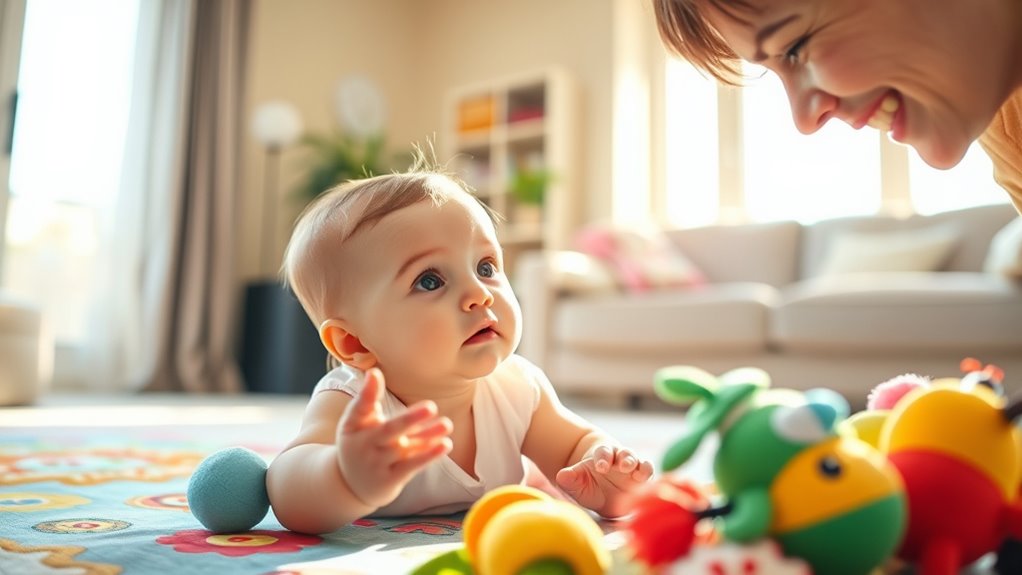
Encouraging your little one to say their first word can be a delightful journey that strengthens your bond. To help your baby learn, repeat a few specific words often. This reinforces their meaning and encourages speech.
Make sure your baby can see your face while you talk; this helps them mimic sounds and stay engaged. Use simple language, focusing on single words and phrases to make it easier for your baby to grasp new vocabulary.
Follow your child’s lead during play, as this keeps them interested and more likely to communicate. Incorporate real words relevant to your baby’s daily life, like names of family members and favorite toys, to motivate them to use their first words.
Use Real Words Your Baby Can Use Everyday
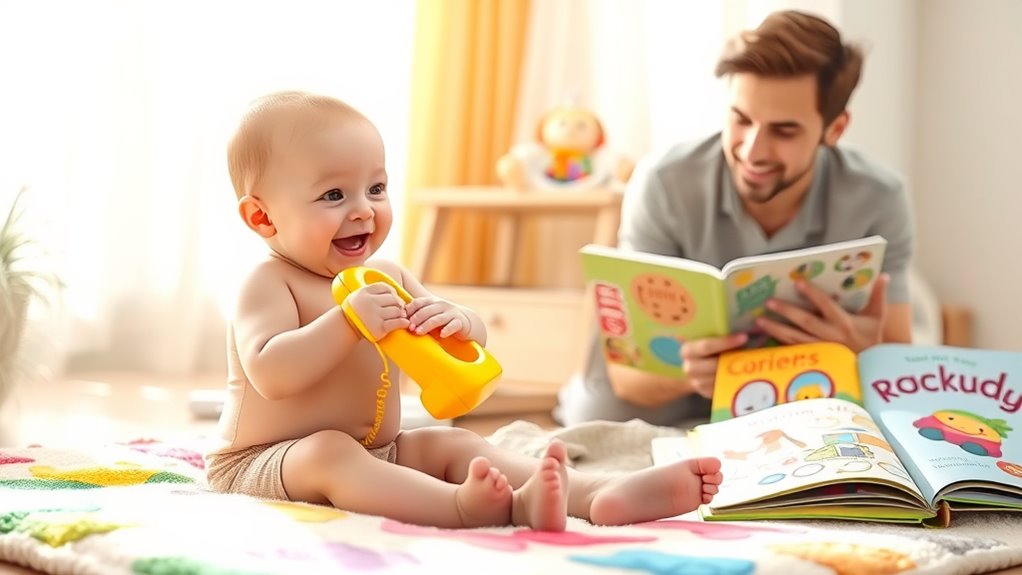
Using real words that your baby can hear and say every day is key to fostering their language development.
To help babies expand their vocabulary, incorporate meaningful words into your daily conversations. Here are some effective strategies:
- Use names of important people, like “mummy,” “daddy,” or “grandad,” to create strong associations.
- Incorporate favorite toys by using simple names like “bunny,” “car,” or “teddy” during playtime.
- Utilize straightforward instructions such as “yes,” “no,” and “look” to help your baby understand common commands.
- Choose motivating words relevant to your child’s interests and daily activities.
Start Talking to Your Baby As Early As Possible

Starting conversations with your little one as early as possible lays a strong foundation for their language skills. Language learning begins from the first few days of life, so talk to your baby about daily activities. This helps them associate words with actions and objects, paving the way for their first words.
While children typically start speaking around 12 months, consistent verbal interaction can encourage earlier speech development. Focus on vowel sounds and early consonants, as these are often the first sounds babies make.
If you have concerns about your baby’s speech development, don’t hesitate to consult a Health Visitor or Speech and Language Therapist for additional support and resources. Engaging early sets the stage for successful communication.
Keep It Interactive and Engaging
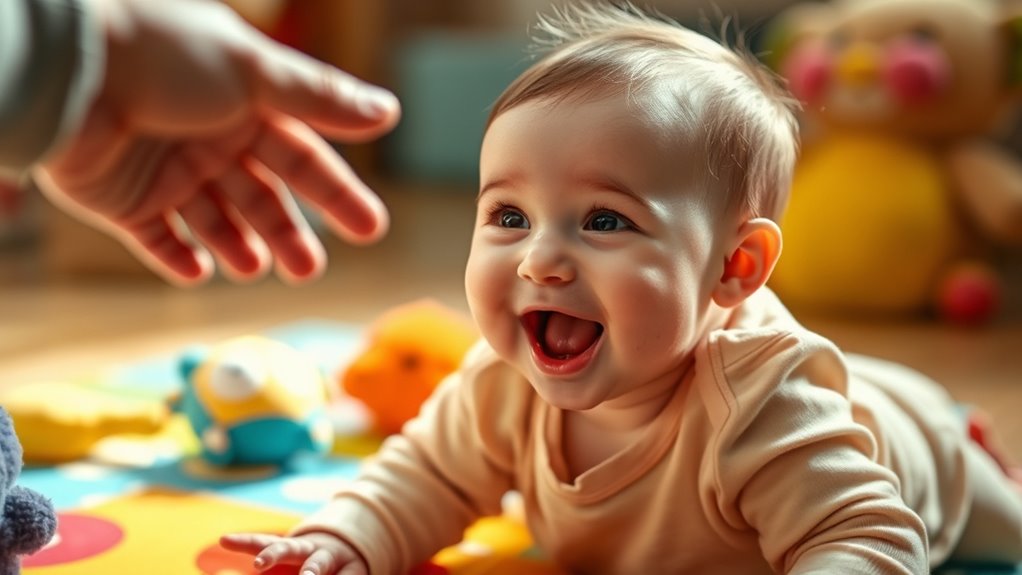
As you engage with your baby, keeping interactions lively and fun can greatly boost their language development. Here are some effective ways to make your playtime more interactive:
- Use the Speech Blubs App: Incorporate fun activities and games that promote language development.
- Sing Songs: Action songs encourage involvement and reinforce vocabulary in an enjoyable way.
- Discuss Activities: Talk about what you see and do during playtime, enhancing their understanding and desire to communicate.
- Let Them Lead: Encourage your baby to take the lead in play activities, fostering their natural curiosity and verbal expression.
Simple Rules for Teaching Your Baby to Talk
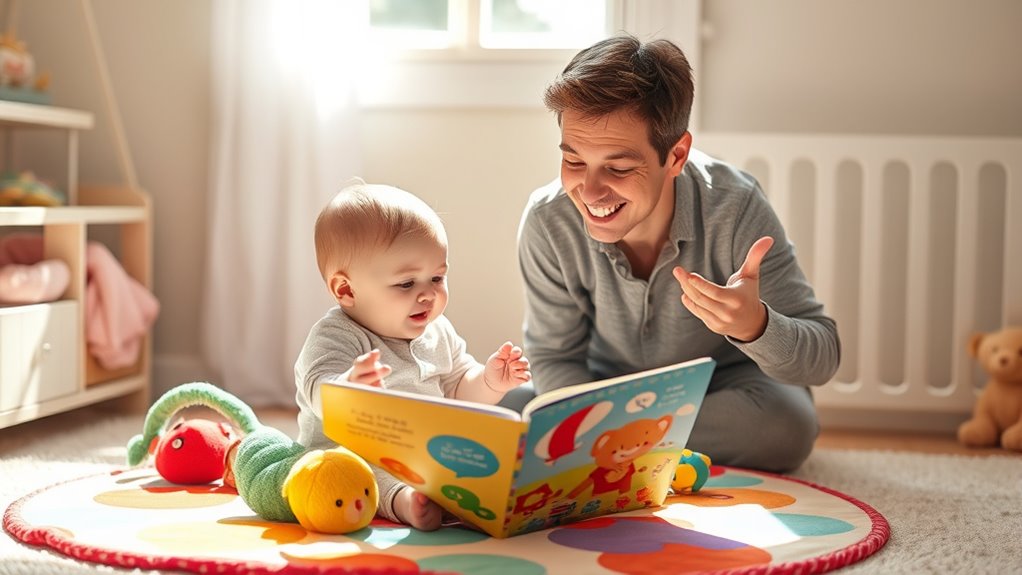
Engaging with your baby in a playful manner lays a strong foundation for language development, but there are specific rules you can follow to further enhance their learning.
| Rule | Description |
|---|---|
| Use Their Name | Capture your baby’s attention for engagement. |
| Simple Language | Stick to single words for easier imitation. |
| Model Language | Speak clearly and consistently to provide a model. |
| Repeat Words | Reinforce vocabulary retention through repetition. |
Frequently Asked Questions
How to Encourage a Baby to Say the First Word?
To encourage your baby to say their first word, make sure you’re frequently using simple, repetitive words during everyday interactions.
Keep your face visible while talking, so they can mimic your sounds. Engage them in play and follow their lead to keep their interest high.
Incorporate names of family members and favorite toys into conversations, and use songs or games to make it fun. This creates a positive environment for language development.
What Are the Best First Words for Babies?
When considering the best first words for your baby, think about simplicity, frequency, and familiarity. Words like “mama,” “dada,” and “baba” resonate due to their repetitive nature in daily life.
You’ll find that terms like “car,” “dog,” and “teddy” connect with your child’s experiences. These words, rich in consonant sounds, make them easier to pronounce.
What Is the Speech Milestone for First Words?
The speech milestone for first words typically occurs between 12 and 18 months, though each child varies.
When your baby starts using a word consistently to refer to something specific, it marks this exciting milestone. You’ll notice they use it independently and repeat it in context.
Common first words often include simple sounds like “mama” or “dada.”
Celebrating these moments helps reinforce their communication skills and encourages further language development.
How Can I Stimulate My Baby’s Speech?
Imagine you’re playing with your baby, holding their favorite toy. To stimulate speech, you can say, “Look! It’s your teddy bear!” and emphasize the toy’s name.
Use simple, repetitive phrases throughout your day, like describing actions during playtime or meals. Engage in back-and-forth exchanges, responding to their coos and babbles.
Reading together daily, with expressive tones, helps connect words to meanings, making it an enjoyable learning experience for both of you.
Conclusion
Encouraging your baby’s first words is an exciting journey that sets the stage for their communication skills. By talking to them early, using real words, and keeping interactions engaging, you’ll help them find their voice. Remember, every babble and coo is a step toward that magical moment when they say their first word. Isn’t it amazing to think about the conversations you’ll share in the future? Keep nurturing their speech, and watch your little one flourish!
